#i had to revisit many intimacy rooms which is why this took a while
Explore tagged Tumblr posts
Text
♡ An Edmond-Post for the struggling fanfic writers ♡
(NOTE: This post will be LONG. I tried to be thorough and include evidence.)
I feel an AGGRESSIVE MORAL OBLIGATION to make this post because of the writing homies that want to write Edmond into their fics, but feel like they don't know enough about him.
My recent Character-Ask post for Edmond might help you guys a little, but I think you could use more information.
The NU: Carnival Lore Spreadsheet (Google Sheets)
This isn't an Edmond-exclusive resource, but still helpful.
If you don't spend any time on the subreddit, you may not have seen this, but this is a fan-made lore spreadsheet contains information the game's world and each of the characters. It hasn't been updated for a little over 3 months, so it's a bit outdated, but it is teeming with practical information that can help familiarize you with characters' backgrounds and such.
(Quick note for Edmond's "Power" category-- although he is unfamiliar with actually using magic, in Frozen Echoes/Tranquil Cloud Edmond intimacy rooms, we discover that Edmond has recently started to practice magic (particularly Light/healing magic).)
2. The current Edmond Era (the most recent Ed Dynamic)
Many people seem to be intimidated by the prospect of writing Edmond because he's a "tsundere." However, to borrow the words from my Character Ask post, "that’s only out of habit (and shyness), rather an actual reflection of his desires." In other words, Ed's inner workings probably look something like this:
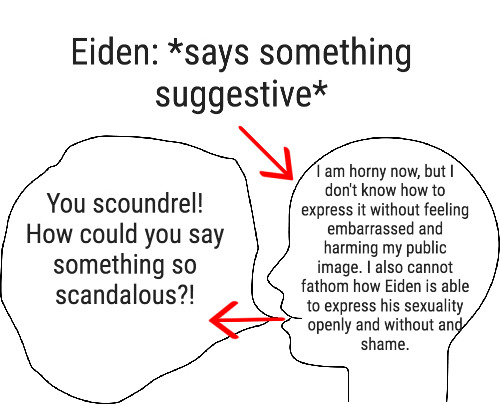
It also is noteworthy that, when Eiden initiates sexual activity, Edmond willingly goes along with him. By that I mean, he might scold Eiden a lot and say something to the effect of, "You are a pervert!" but he doesn't actually tell Eiden to stop what he's doing when they're starting out. And while it doesn't happen as often in recent rooms, the habitual "Stop♡" and "No♡" Edmond might say are very clearly insincere, considering his tone of voice (as well as his physical reactions).
And during the rare occasions where Ed does tell Eiden something like "Stop," Eiden will stop; but then Ed will look disappointed, so Eiden will ask him if he wants to continue, and Edmond will say yes. Here's an example of this type of exchange from Sweet Aroma R2:
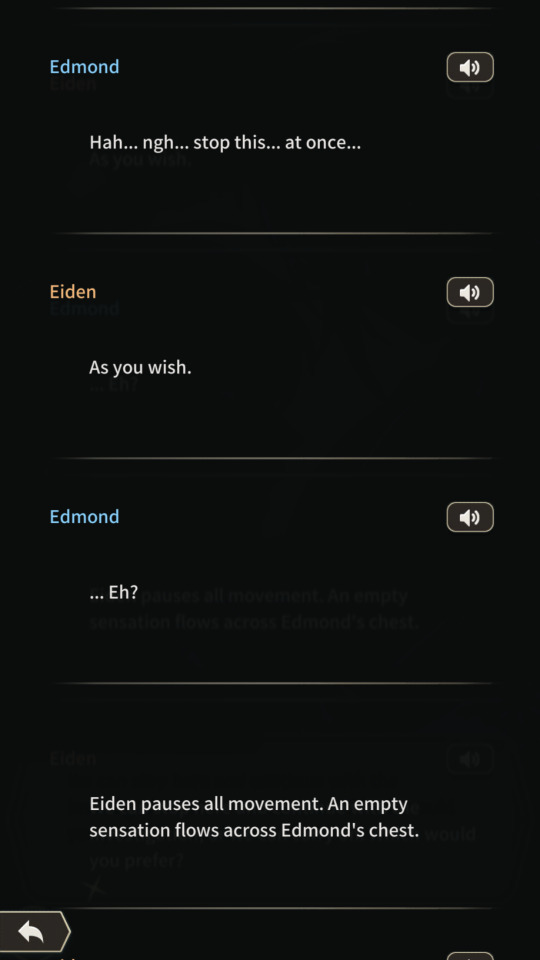
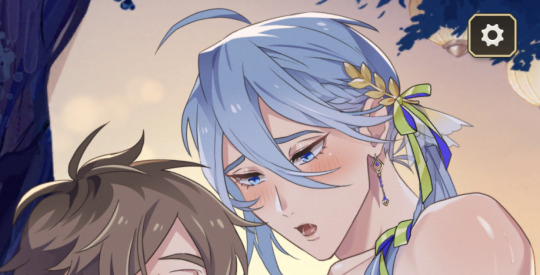

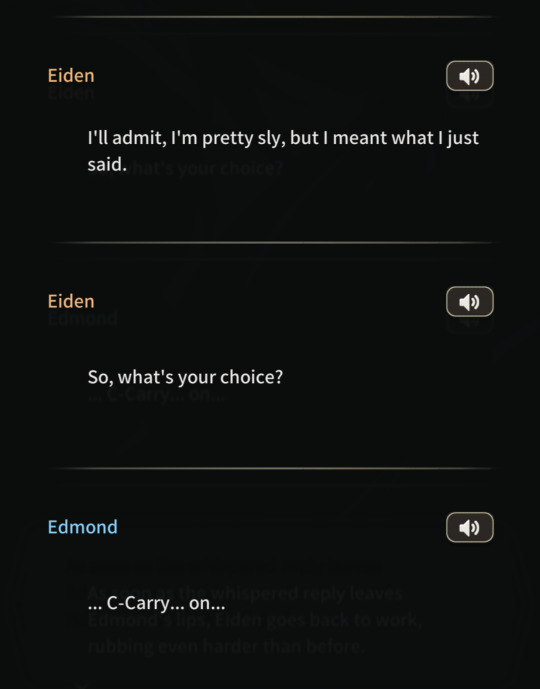
There have also been times when [we can infer], at the beginning of H-activities, Eiden doesn't have as clear of a read on Edmond's opinion; in which case, he will verbally search for confirmation on whether he can do more. The most accessible example of this is Ed's SR R3:

Here is another example, from Tranquil Cloud R5:
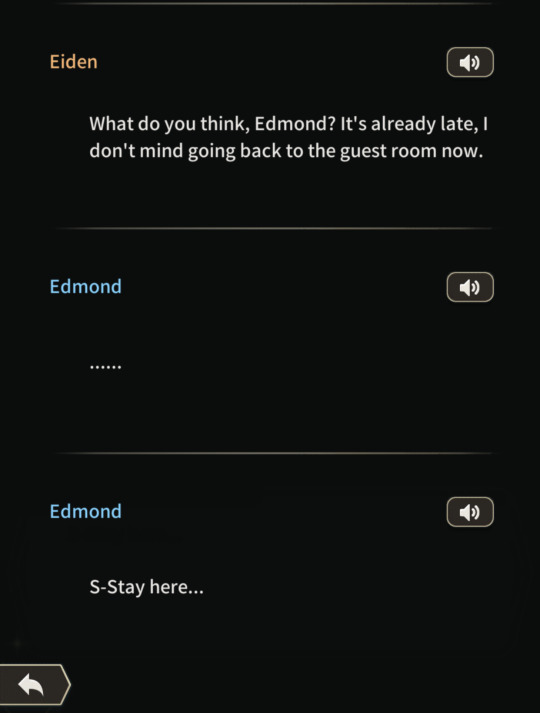
While Eiden is still the one that initiates sexy activity (14/16 of the Ed H scenes), Edmond willingly goes along immediately. That is the crux of the typical Edmond dynamic: Edmond also has strong desires, but is usually too embarrassed to admit them, so he needs an understanding partner that will guide him along until he feels secure enough [and/or horny enough] to admit his wants.
Edmond is in a bit of a transition period right now. He's starting to be much more active in his H-activities with Eiden. He also might "blame" Eiden for his own desires, but he's beginning to own up to his feelings, too. From Tranquil Cloud R2:
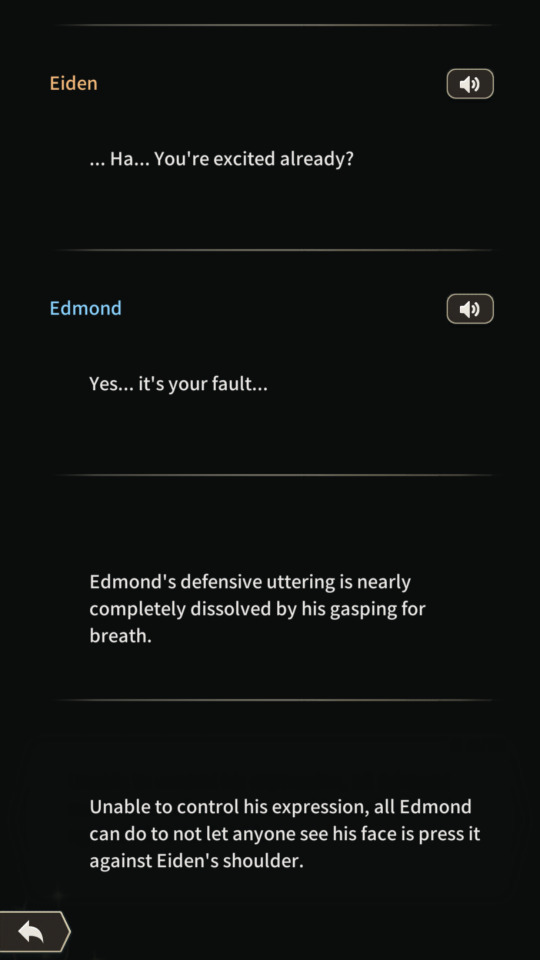

3. Edmond Anatomy & Kinks
One word: SENSITIVE. Edmond is HELLA SENSITIVE.
(I'd argue he's even more sensitive than Olivine, but idk if you could consider that a definitive fact or not.)
If there's an area that can be considered a relatively common erogenous zone, it's most likely an erogenous zone on Edmond. Here's the one's that have been canonically confirmed or STRONGLY suggested:
Mouth - Edmond's mouth is very sensitive. When he kisses for the first time in Sweet Aroma, Eiden coaxes him into admitting which specific parts of his mouth are most sensitive; roof of his mouth, tongue, sides. Edmond likes kissing a LOT, and has initiated kisses himself at least 3 times (Elite Instructor R5, Flaming Secret R5, Tranquil Cloud R5)
Ears - Ed has a strong reaction in Tranquil Cloud R2 (Eiden blowing on his ear helps send him over the edge to finally cum)
Neck - Eiden kisses his neck and Ed has a verbal reaction in Tranquil Cloud R5
Nipples - Best example is in Sweet Aroma R2 (he can cum from nipple-play alone); also featured in Spring Chaos R2 and Elite Instructor R2
Hands - Many rooms include Suggestive Hand-Holding™ but White Lover R2 includes significant hand-play
Stomach/Waist - White Lover R2 includes Eiden caressing Ed's stomach, and in Tranquil Cloud R2 Ed has a strong reaction to Eiden tightening his hold on his waist
Ass - In Elite Instructor R2 Edmond gets spanked and he is VERY into it
Penis - *obvious answer is obvious*
Anus - Has cum from anal-play alone multiple times (including fingering and rimming). It isn't explicitly stated, but I'm pretty sure Edmond's anus is more sensitive than his penis
Additional canon sexual preferences:
A Little Pain - As is famously known, Edmond enjoys a little pain during sex
Praise & Dirty Talk - Gets very embarrassed by it (and will usually scold Eiden) but he has strong positive reactions to it
Roleplay + Dom/Sub Undertones - We see it in SR R5; once Ed is convinced to try it out he gets extremely aroused and feels more comfortable engaging in *mild* dirty-talk himself. It's also sorta-kinda in Elite Instructor R2, but only a little bit on Eiden's part (calling Ed "sensei")
Kissing - I mentioned it before, but I must emphasize it again; EDMOND LOVES KISSING
Overstimulation - Most Ed intimacy rooms include some element of this
Semi-Public Sexy Stuff? - Depending on if you count sex-in-a-carriage, this happens in 7-8/16 intimacy rooms. Idk if this is necessarily Ed's personal kink, but Ed isn't exactly opposed to it as long as Eiden is being careful. He does appear to get excited when Edmond says something like "don't be too loud, or someone will come and see you like this!" From Elite Instructor R2:
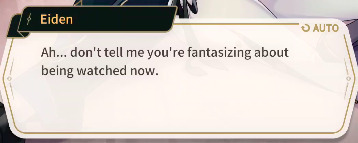
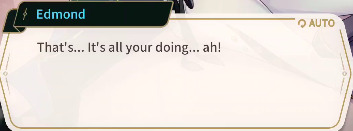
Light Bondage - Only seen is Elite Instructor R2, but he seems to like it:
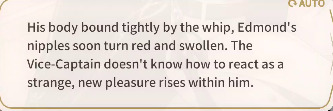
4. Some Ao3 reading recommendation that you can use for Edmond-specific inspiration/references
As a passionate Edmond-Lover, here are some works of fanfic that I think do a particularly good job of writing Ed-relationships. Obviously (by the nature of fanfic) many of them take a lot of liberties, but when I was reading these stories, I didn't need to suspend my disbelief at all. The way Edmond acts in these stories feels very in-character to me.
(NOTE: All of these recommendations are NSFW where Edmond bottoms. Be sure to read their tags!)
Literally everything luster_candy has written (6 works at the time I'm posting this) - just be aware all of it is Eiden/Edmond.
Reprieve, Release by kkuro (~11k words) - Eiden/Edmond, one of the best (if not the best) BDSM-heavy Ed fics. Only note is, because this was written in 2022, Ed acts a bit more stiff/repressed in the beginning than he would now. In-character for Early Era Edmond tho.
A Helpful Hand by dracula (orphan_account) (~4.3k words) - Olivine/Edmond, Olivine tops (a rarity) and Ed is cursed with a V. Don't worry, Olivine-Lovers, he isn't a hella OOC sadist or ultra-masculine dom. XD Just very sweet and very horny, and Edmond is ruthlessly subjected to his brand of horny nonsense.
Do You Know Where the Wild Things Go by no birdstofly (~8k words) - Yakumo/Edmond, idk if it's OOC for Yakumo but it's in-character for Current Era slightly-more-honest Edmond.
The Knight's Discipline by RiyeRose (~3k words) - Restricted to Ao3 members, Kuya/Edmond. I subscribe to the belief that Ed would put up with Kuya if he were horny enough, which is why I don't consider this OOC. I think this fic has the perfect amount of BDSM that Ed would realistically enjoy.
Fanfic where Edmond tops is honestly very hard to come across. That's understandable, because for Edmond to top, there would have to be extremely special circumstances, and it would have to be written carefully in order to not seem too OOC. The best example of an Top-Emond fic I've been able to find is this:
Hidden Guidance by Okami01 (~1.9k words) - Edmond/Olivine, Edmond shyly admits he wants to try topping Olivine, and Oli is obviously down for it. (Let's be honest here; out of everyone, if Edmond were ever to top anyone, it would 100% be Olivine)
♡I hope people found this helpful!!!♡
I know reading this giant post was like reading an essay, but hopefully it was worth the time and effort I put into it!
If anyone has extra inquires, or if other Edmond-Lovers want to chime in with extra information I might've missed, feel free to put them in the comments!
#nu carnival#nu: carnival#nu carnival edmond#i had to revisit many intimacy rooms which is why this took a while#Edmond is love Edmond is life
159 notes
·
View notes
Text
Lan Wangji (mostly, his love)
LAN ZHAN! I read somewhere that this was said 102 times by Wei Wuxian in The Untamed. It feels like an understatement, cause I’ve watched the show so many times now I could hear ‘Lan Zhan’ being called in my sleep...
My first time watching the drama, I was full on Team Xianxian. I mean, who would not be? He’s the central character of the story, he’s the first thing you see within the first few seconds of episode 1, and who could resist his sunflower aura? I was not into Lan Wangji at all. I remember this clearly because I just found an old Instagram story in my Archive on the day I first watched this show: a screenshot of Wangji’s face in episode 3 and my caption was: ‘OMG how could Wei sunshine fall in love with this dry and boring man?’. And just like how Wangji eventually swallowed all of the statements he had made about the young Wei Wuxian (’I don’t touch other people’, ‘We’re not close’, etc.), I am not the same person on that fateful day tuning in the first episode on Netflix. I am now Team Hanguang-Jun through and through!
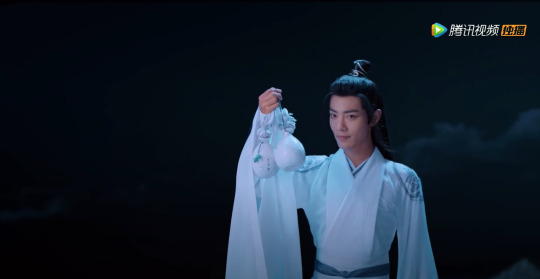
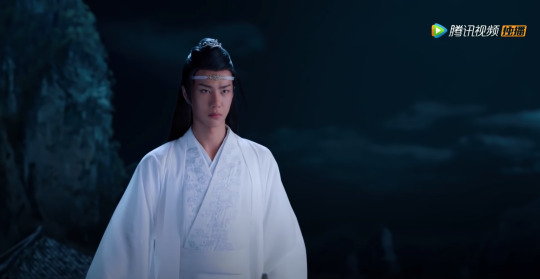
What I’ve been enjoying so much these days is watching random earlier/later episodes just to compare how Wangji’s attitude changed toward Wei Wuxian over 16 years-ish. It’s probably so obvious for everyone that he definitely falls in love first, even when the drama purposely made their early relationship a lot more intense comparing to the novel i.e. showing Wei Wuxian somewhat feeling the same way about Wangji in his first life, with the constant flirting and mutual pining (don’t even get me started...). Now that I kinda understand what the character is like, it makes a lot of sense the way he processed his feelings for Wuxian in his youth. I wonder how different he would have reacted without the push from the best brother/wingman in the cultivation world - Lan Xichen. Sure, Jiang Cheng had a lot to say about this too, but mostly out of a slight envy (I reckon) over Wuxian’s new subject of desire. But Lan Xichen sees through his brother, and has been pretty much WangXian fanclub admin since day 1. I don’t have a brother, but man, I wish Lan Xichen could be mine.

In my humble opinion, the fact that we were given 3 versions of Wei Wuxian throughout the series kinda gifts us 3 versions of Lan Wangji too in a way - the straight face, the confused heart, and the national boyfriend/husband. Considering the number of times I rewatched the latter half of the series i.e. episode 33 onward, I just want to write down all of my thoughts about the national boyfriend/husband Lan Wangji, and not just because that version seems to have the most lines comparing to the other two.
There are several details that were not explained much in the series (although shown on screen) so I have to read from the novel later on. But oh my god, the stuff I found... I never realized that the scene before Lan Wangji went to Mo’s manor where his guqin was playing behind him standing on the balcony referred to how he used Inquiry to find Wuxian. What Jiang Cheng said to him about having gone to a lot of places for 16 years and searching for someone completely went over my head in the first watch, and imagine how I scratched my brain revisiting that part. That plus ‘oh I’ve never seen you at a cultivation conference before’ in episode 41 - my goodness, because he was spending ALL of his time LOOKING FOR Wei Wuxian.
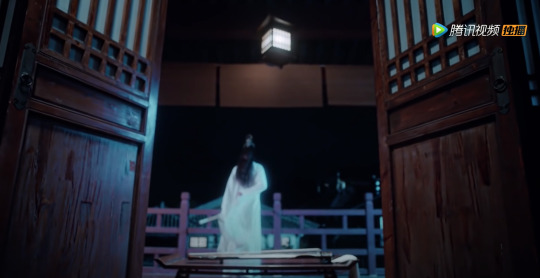
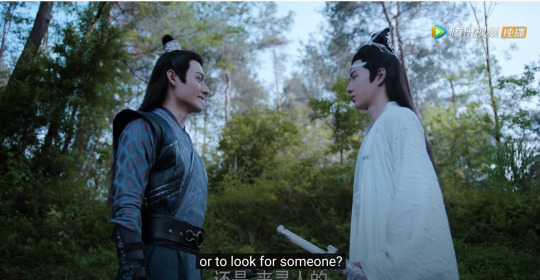
Another thing I hope would have been addressed in the series was the hot iron mark on his chest. I thought the story of him drinking wine and giving himself a mark identical to Wuxian’s was the prime work of a broken heart. He must have thought about their conversation in Xuanwu cave, about the mark staying on his skin forever and how Wuxian was convinced Mianmian would never forget him. Was that how Wangji was making a point of never forgetting Wei Wuxian? If that scene made into the drama, I would have thought Wangji’s character song Buwang to be play in the background. The lyrics fit the situation so much.
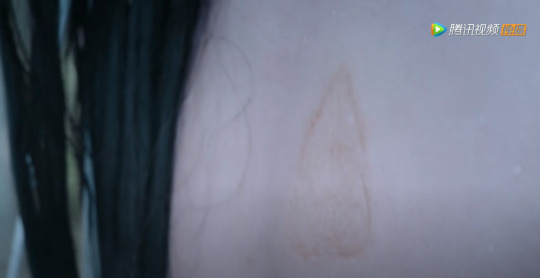
Personally, everything from episode 33 onward was perfection for me, finally getting to see Wangji embrace his feelings and ACT ON THEM toward the romance-blind idiot Wei Wuxian (yes, he totally is). All the caring touches and details played out so astonishingly. One of my favourite (which doesn’t seem to be a popular one since I have not seen many gifs of it on Tumblr) was when, after interrogating Huaisang, Wangji comfortably moved over the other side of the table and picked up Wuxian’s left leg to CLEAN THE EVIL SPELL - think of the level of intimacy this act is! Although that came after the romantic piggyback under the moonlight, I thought that speaks volume for someone who doesn’t even physically interact with his family members, and serves as a great follow-up right after he, again comfortably, pulled up Wuxian’s trousers to check his leg.


What I thought was always presented so beautifully is every time Wangji serves Wuxian liquor. The way he carefully picks up his sleeve, prepares the cup (I know they’re probably not called ‘cups’ but I can’t find another word), pours the liquor and slides it over to his partner is so well demonstrated and shows how much he wants to properly take care of Wuxian. Would you put so much effort in such a tiny mundane act if you’re not doing it for the most important person in your life?

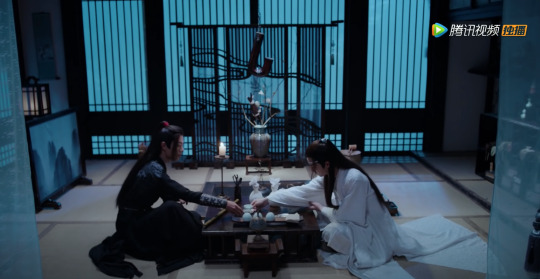
In a way, I feel like everything he does is making up for what he could not do the past 16 years, including remembering so many tiny details and keeping all sort of Wuxian-related things. My favourite Wangji keepsake moment, despite being a very short one, is the butterfly talisman at Yunping City which he gave to Wuxian to rescue Wen Ning. I don’t know why that moment makes me really really happy, probably because that was one of the earliest items Wangji could have kept hold of from Wuxian’s. That tells us how way long before he was developing feelings toward this little rebel. Not to mention, we did see Wangji even use this very talisman in episode 11 when he encountered Wen Chao on his way back to Cloud Recesses.
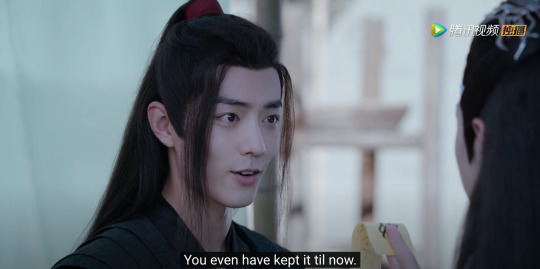
Yes, the ‘I knew he was Wei Ying all along’ while having all the swords pointed at you is highly pivotal as it’s basically the censored version of ‘I love you’. BUT, the moment all leading cultivators of all major and minor clans ran to Burial Mounds just to witness Lan Wangji standing proudly without flinch on the other side with Wei Wuxian makes me appreciate that whole arc a lot more than the big revelation in the last 3 episodes. Wangji ignoring his own Grand Master, Wuxian once again standing against every single person in the cultivation world but with so much confidence this time around - to me, is beyond satisfying. I love this arc so much so I wrote a separate piece about episode 44-45 - if you’re interested in more of my random thoughts, feel free to have a read here.
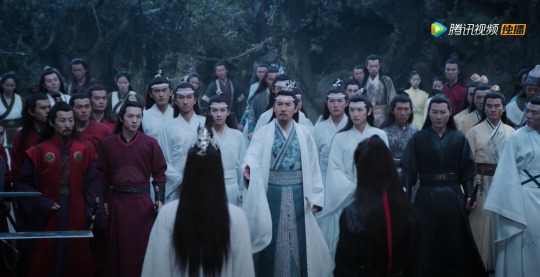

Thinking about all this, I’m absolutely in awe of how protective national boyfriend Wangji is to Wei Wuxian even before knowing he lost his golden core. They either have insanely accurate GPS, or just really good telepathy. Wangji’s constant attention to his partner (without having to verbally find out where he is) blows my mind every time. Remember how proud Wei Wuxian was having Lan Wangji come out just in time to fight Xue Yang at Coffin Town? That’s how much Wangji’s love and trust empowers Wuxian and makes him so so so secured, even when everyone was walking around in the fog hiding from the most notorious killer and his puppets.
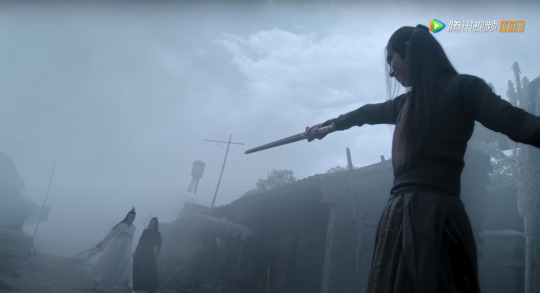
The one detail that pushed me over the edge completely (thanks a lot Lan Xichen) was the story of Wangji’s mom. Oh my god, baby Wangji sitting in the snow really messes with my head. I cannot believe it took 40 something episodes for us to learn about Wangji’s emotionally damaged upbringing and what shapes him into a stubborn lovebird as we know today. It adds A LOT more context and sadness to his famous phrase ‘bring a man back to Cloud Recesses and hide him’, as well as Lan Qiren’s statement ‘have you not learned from your father’s lesson’. I revisit the ‘bring back and hide him’ scene with a completely new perspective and can sense Wangji’s pain and confusion that Xichen described. The desperation in that statement of Wangji was a lot heavier in my eyes now that I understand the back story. If I were Wei Wuxian listening to all of that from Lan Xichen, I would probably have a meltdown right there at the doorsteps of the Silence Room.
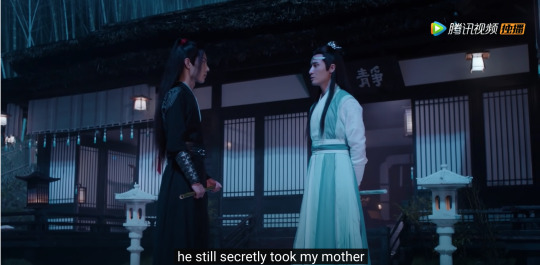

Now we all know the source of inspiration of the infamous ‘I want to bring a man to Cloud Recesses. Bring him back and hide him’ in episode 25:
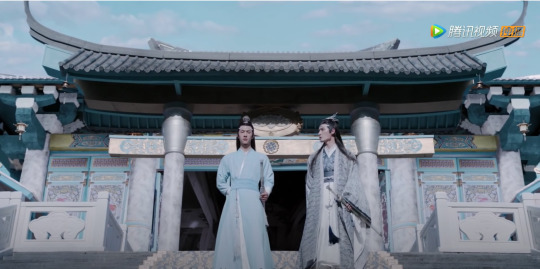
So after all of Xichen’s effort in telling Wuxian how Wangji actually feels about him through the tear-jerker story about their parents, Wei Wuxian STILL asked Lan Wangji WHY he was willing to seal Bichen and his own spiritual power so that Jin Guangyao would not hurt him. This dense man, of course, brought up the guilt card i.e. ‘Oh you don’t owe me anything’. I mean COME ON NOW YILING PATRIARCH! CAN YOU ACTUALLY BE THAT OBLIVIOUS WHEN IT COMES TO THE MAN THAT TOOK 300 LASHES ON HIS BACK FOR PROTECTING YOUR LEGACY?
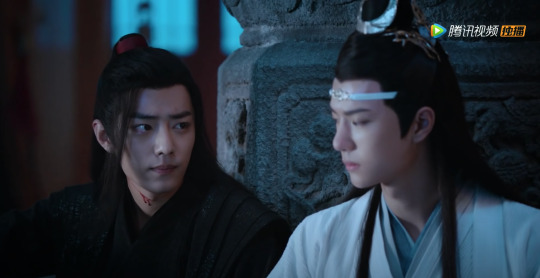
I know it went the other way in the novel, where the big confession happened. Maybe a bite from Fairy could do you some good, or just talk to Lan Xichen some more and then you can start appreciating your soulmate the way he deserves.
The silver lining after being deprived of an epic love confession is everything that happened in episode 50. It might have not been spelling-it-out clear as in ‘I love you’ ‘I love you too’ because of the government censorship, but it’s easily the most obvious yet emotional type of ending the production team has worked to hard to deliver. If you are still having trouble processing the allegedly ‘ambiguous’ finale, I can help with that - here. Just a heads up: it’s a happy ending.
Good to know Wei Wuxian has the rest of his life making up to Lan Wangji. Everyday means everyday, because Wangji deserves THAT much!
#wei wuxian#wei ying#lan zhan#lan wangji#hanguang jun#the untamed#mo dao zu shi#chen qing ling#gusu lan#character analysis#thoughts#yiling patriarch#yiling laozu#xiao zhan#wang yibo#lan xichen
196 notes
·
View notes
Text
Michelle Terry interview with The Stage
Michelle Terry: ‘This job has taught me that democracy is really hard’
by
Natasha Tripney
- May 29, 2019
Shakespeare’s Globe artistic director Michelle Terry tells Natasha Tripney about taking over from Emma Rice during a period of trauma for the organisation, why she chose the ‘mythic’ history plays for her latest season, and why Shakespeare will always be relevant
Less than half an hour before our interview, Michelle Terry was on stage playing Hotspur in Henry IV Part I, and when we meet she’s still sporting the character’s black nail varnish and tattoos.
The artistic director of Shakespeare’s Globe is careful with her words, but there’s an undercurrent of exhilaration to her responses as she curls up in an armchair in a corner backstage. That’s no surprise given this is the first ‘trilogy day’ of the venue’s summer season (there will be six in all).
Over the course of the day, the ensemble company will perform Henry IV, parts I and II and Henry V. “It’s extraordinary going out in front of an audience who you know is going to be with you for the long game,” she says.
Explaining the thinking behind this year’s programme, Terry says: “At a time when our nation is in such a state, it made sense to do the state-of-the-nation plays.” The intention is to put on all of the history plays sequentially. The programme began earlier in the year with Richard II in the Sam Wanamaker Playhouse with Adjoa Andoh playing the title role. Henry IV and Henry V are playing on the main stage and the cycle will return to the Sam Wanamaker for Henry IV and Richard III, to better explore “the domesticity of these plays, to view them through the prism of candlelight”.
Having referred to them as the history plays, Terry quickly corrects herself: “Calling them history plays reduces them. They’re mythic. We wanted to do all of the myths.”
As Hotspur, Terry is in her element, her performance vivid and playful, dashing, daring, funny. It’s the performance of someone who has total understanding of the space, its potential for intimacy and connection. Her strength of feeling for the building is similarly palpable.
Coming home to Shakespeare’s Globe
When we spoke in 2016, Terry talked with great affection about performing at the Globe, describing it “as a place unlike any other”. When she was appointed artistic director in July of the following year, the trajectory made sense. She took over the role from Emma Rice, who left after only two seasons in charge after disagreements with the board.
Although Terry knew the venue well as a performer, she was less familiar with its workings as an organisation and educational centre. So as well as taking over under difficult circumstances, there was a lot to learn. Looking back, she is able to recognise how tough this transition period was. “The big learning curve was understanding my place as artistic director in the organisation, at a point when it was bruised and people needed healing. It was traumatic.”
In the theatre industry, she adds, “the line between the personal and the professional can be wafer thin”. It was very personal for everyone, but she hopes good has come from it. When she announced her first season, she said: “Emma Rice was the best thing that ever happened to the Globe because it has forced an organisation to go through a healthy form of protest.” Throughout our conversation she returns more than once to the image of collapse and renewal. “We’re still in the renewal phase of figuring out who, how and why we are.”
One of the main features of her first season was the ensemble company with whom she staged Hamlet and As You Like It. She has spoken about a wish to dismantle hierarchies and create work collaboratively with the actors in the creative process.
This year she will revisit and expand the ensemble model. Whereas last year a company of 12 actors performed two plays, this year a company of 10 (11 if you count Terry, though she only performs in Henry IV Part I) will stage all the history, or rather myth, plays. As with last year, it’s a diverse company, with a 50/50 gender split. Part of the thinking behind the ensemble is that it gives the actors more time to work on the texts. “We live together with these plays for 15 weeks,” Terry says. There’s also a longer preview period, because, while a lot of dramaturgic work happens in the rehearsal room, “with Shakespeare you need to test it in front of an audience”.
One of her main intentions is to “release the plays from literal casting”. This is something she reiterates throughout our conversation – that Shakespeare’s plays are anti-literal and mythic. Anyone can play any role. “Shakespeare had an interest in human beings.” That’s a healthier way of looking at his work, she says, adding: “To think what type of human being is this, as opposed to whether they are male or female. The plays are much bigger and multitudinous than that.”
They’re more than fairytales, they’re ‘fated tales’ and “the minute we reduced them to literalism we reduce ourselves”, she adds. Last year, Jack Laskey played Rosalind in As You Like It, and Terry played Hamlet. In the current season, Sarah Amankwah plays Henry V opposite Colin Hurley’s Katharine. Helen Schlesinger plays Falstaff across the season.
She’s aware “our core audience has been through quite a ride with different artistic directors over a short space of time” and wants to reassure them that the work is still experimental. “It’s still radical. Theatre should be provocative but nothing we’re trying to do is antagonistic. I hope it’s liberating.”
One of the biggest successes of that first season was not a production of Shakespeare, but a new play about a writer inextricably linked with him: the English poet Emilia Lanier. Terry had long been fascinated with her. The name Emilia occurs often in Shakespeare’s plays: “I kept accumulating information about her.” She decided to shape the first season around her and stage all of the plays in which Emilia is mentioned. When she approached the playwright Morgan Lloyd Malcolm about the idea of writing a play about the poet, “she burst into tears and I thought: ‘Here we go – that’s your commission.’”
Emilia review at Vaudeville Theatre, London – ‘Morgan Lloyd Malcolm’s play roars into the West End’
Emilia, performed with an all-female cast, ran for just 11 performances at the Globe last summer, but during that time it struck a chord with audiences. The energy it generated, with its galvanising final speech and sense of reclaiming the stage, was incredible. A West End transfer followed. “It’s clearly chimed with many people, not necessarily just women. It’s about wanting to have a voice and be heard.”
The challenges of running the Globe
According to the Globe’s annual report, the 2018 programme, which consisted of 11 productions, attracted 364,422 theatregoers, which amounted to 89% of the Globe’s maximum capacity. School visits were down as was footfall, something attributed in the document to the terrorist incident at London Bridge and cuts to arts education. All of which means the Globe has been obliged to put its major Prospero Project – to create a new library and archive – on hold.
This also explains why, despite the success of Emilia, a decision has been taken not to programme any new writing in the main space this year, though there will be new writing in the Sam Wanamaker Playhouse in the winter. Terry cites the unpredictability of Brexit as another factor: “It means we had to be canny about the programming.” It takes time to invest in new writing, she says, especially as the remit of new work at the Globe is that it needs to be tailored to the architecture. “It made sense to give ourselves a year off to invest in writers for 2020.”
The Globe wants to stay reactive, she says, and that’s easier to do with new writing, but Shakespeare’s plays are timeless. “There’s always something in them that illuminates now.” There’s something comforting in knowing things have always been like this. “We’ve always been on the brink of civil war. We’ve always questioned leadership and power.”
What has her first year in the job taught her? “Democracy is really hard.” It’s hard for everyone involved, she stresses, be it assuming a position of power or giving power up. “How do you share responsibility, ownership, accountability? At a certain point the buck has to stop.” She believes theatre is a collaborative and collective art form and “if we’re not having collaborative conversations then it become a disingenuous transaction”.
She adds: “If theatre is to remain vital, then it’s vital we recognise that every individual comes with needs.” This includes parents – she spends a lot of time thinking about ways of improving things for parents in the industry – but it goes deeper than that. “It’s our responsibility to meet whatever those needs are in order for people to thrive, whether it’s an issue of childcare, carers, access. There’s not one size that fits all. Everything needs to be questioned.”
When Terry was six, her family moved from Nuneaton to Weston-super-Mare. In an effort to help her settle in and get to know people, her parents enrolled her and her brother in a local amateur dramatics group. “It’s hard being the new kid, but if you can pretend to be other people it’s easier.” She felt safest playing other people.
Though they’d sometimes go into Bristol to see plays, the Weston-super-Mare pantomime was one of her first introductions to theatre. The best pantomimes, she says, engage with the audience. “I had to sit in the middle of the row, the idea that someone might pick on me or talk to me was terrifying.”
Once she’d decided she wanted to work in theatre, she set about finding ways to make it happen. Following a degree in English at Cardiff University, she applied and got in to RADA. It’s important, she stresses, to have a period of time in your life when you “learn how to fail and how to pick yourself up”.
She made her stage debut in 2004 as Edith, the maid, in Peter Hall’s production of Blithe Spirit, alongside Penelope Keith, Joanna Riding and Amanda Drew. The production ended up in the Savoy Theatre in the West End. Barbara Kirby – who played Mrs Bradman – and Terry couldn’t believe their luck. “We’d always wanted to do theatre – and here we were doing it.”
Having worked on Blithe Spirit for a year, Terry ended up back in Weston-super-Mare working as a medical secretary. “That was awful,” she says. Having lived the life she’d dreamed of living, she was worried that was all she would get, that it wouldn’t happen again. Then in 2005, she was cast as Celia in As You Like It at the New Vic in Newcastle-under-Lyme and, as she puts it, “got lucky”.
A Royal Shakespeare Company casting director was travelling from Edinburgh when his train broke down and he ended up seeing her show. This led to her being cast in Dominic Cooke’s 2006 production of The Crucible. From that point on she’s worked steadily. “There never was a shooting star moment”. There have, however, been “painful periods of not working.” Then suddenly, she says, there are moments in which you realise: “Oh my God, I’m 40 and I’ve been doing it for 20 years. Only then can you finally allow yourself to say: ‘Okay, we’re doing all right.’”
Terry’s work at the Royal Shakespeare Company included Pericles and The Winter’s Tale. In 2007, she made her first appearance on the Globe stage in Love’s Labour’s Lost. In 2011, she won an Olivier award for best actress in a supporting role for Nina Raine’s Tribes, in which she played a woman gradually losing her hearing.
She acquired a reputation as an actor of nuance and insight. The Guardian’s Michael Billington referred to her as “a thinking actor,” meaning her approach to the roles she plays is as analytical as it is intuitive. Observer theatre critic Susannah Clapp called her “one of our most glorious actresses”.
Terry starred in Marianne Elliott’s All’s Well That Ends Well in 2009 and The Comedy of Errors, both at the National, returning to the Globe in 2013 to play Titania in Dominic Dromgoole’s production of A Midsummer Night’s Dream. “Shakespeare is and will always be my first love,” she says.
Continues…
Q&A Michelle Terry
What was your first professional theatre job? Blithe Spirit for the Peter Hall company.
What’s your next job? No idea.
What do you wish someone had told you when you were starting out? One in five people won’t like you and there is nothing you can do about it.
Who or what was your biggest influence? My old amateur dramatics teacher, my music teacher and Shakespeare.
What’s your best advice for auditions? Auditions are a separate skill – treat them like they’re meetings. It’s as important for you to know if you can work with who you’re meeting, as it is for them to know if they can work with you.
If you hadn’t been an actor, what would you have been? I never gave myself the option.
Do you have any theatrical superstitions or rituals? Tongue twisters: I have a sequence I have to do before every show, otherwise God knows what will happen.
The following year she was back at the RSC for Christopher Luscombe’s double-bill of Love’s Labour’s Lost and Much Ado About Nothing, and reunited with McIntyre to play Rosalind in As You Like It at the Globe in 2015. One of her most flooring performances was in Katie Mitchell’s merciless production of Sarah Kane’s Cleansed at the National.
What drives her as a performer is “that feeling that you’re part of something that matters,” and she adds: “If you throw yourself into every role that you do, there will always be a moment where your life changes because of it.”
We talk about the cuts to arts in education. She grows even more impassioned, her frustration palpable. In order to develop an understanding, a love, of Shakespeare, she explains, it’s essential to have the opportunity to see it performed. “Theatre is so experiential. The plays are meant to be experienced. They are vibrant and vital and alive.”
Shakespeare is not just words on a page. We don’t appreciate the power of language to transform, she says, invoking Greta Thunberg, “this young kid standing with just words and everyone listening”. She mentions the Globe’s Playing Shakespeare education project for schools, in which 20,000 free tickets were given to students for Romeo and Juliet. “These London kids who experience knife crime every day are watching a play about knife crime – it’s so powerful. Theatre has the capacity to be miraculous,” she says.
One of the things she’s struggled with over the last year is “carving out time to be reflective, which is so important to staying creative”. Her daily life is “so atomic” and currently it’s hard to think past Hotspur, which lines landed, which didn’t. “It’s hard to find time.” Especially when running a major building.
Director Ian Rickson taught her a vital lesson about being an artistic director. He told her: “There are very few people who will understand how overwhelming it is – all I can say to you is: don’t miss the abundance.” With a job like this, she says: “We’re in the weeds all of the time. It’s important to take a moment to look up and realise how lucky we are.”
CV Michelle Terry
Born: 1979, Nuneaton Training: RADA Landmark productions: • Love’s Labour’s Lost, Shakespeare’s Globe, London (2007) • All’s Well That Ends Well, National Theatre, London (2009) • Tribes, Royal Court, London (2010) • A Midsummer Night’s Dream, Shakespeare’s Globe (2013) • Love’s Labour’s Lost and Much Ado About Nothing, Royal Shakespeare Company, Stratford-upon-Avon (2014) • Cleansed, National Theatre (2016) • Henry V, Regent’s Park Open Air Theatre, London (2016) • Hamlet, Shakespeare’s Globe (2018) Awards: • Olivier award for best actress in a supporting role for Tribes (2011)
Shakespeare’s Henry plays run at the Globe until October 11
© Copyright The Stage Media Company Limited 2019^
2 notes
·
View notes
Text
Life is Strange: Before the Storm Game Review (7.5 / 10)

**SPOILER ALERT** (If you’d like to avoid spoilers, but still receive my input on the game, the Intro and Final Thoughts will always remain spoiler free.)
Intro:
I was recently speaking with a friend who described herself as “anti-video game.” When I asked her about it, she responded with the common belief that she found them a waste of time. In a market dominated by MOBAs and Battle Royales, I decided to make my case for video games from the narrative side of things, asking her if she had heard of (the original) Life is Strange game. She hadn’t, but immediately wanted to know why it was any different, why it wasn’t a waste of time, and how it changed / impacted me for the better.
I explained to her that Life is Strange reminded me of the great struggles each and every person faces. It shed light on the everyday ways, big and small, that I could help make burdens lighter for others. It reminded me that every choice in life matters, and not only did it show me ways to love, but it inspired me to love better, to cherish every beautiful moment, and to be grateful for every person whose life touches mine, or at the very least not to take their presence for granted. Needless to say, after our conversation, she was very interested in playing the game.
This power to change me is what made the first Life is Strange so great, and additionally what made me so eager jump into the 2017 prequel series, Life is Strange: Before the Storm. However, from its early stages, developer Deck Nine made it clear that Before the Storm would be a different game, and after playing it, I found that indeed it was. In some ways it surprised and thrilled me, and in other ways it returned to that same nostalgia I missed from the original game. There were, of course, also some elements of the game I would have done differently. I’ll give my thoughts on the game below, focusing mostly on its narrative elements, and as always leave a summarized TLDR (spoiler free!) version in the Final Thoughts section. Thanks for giving me a read, and here’s to making and playing the best games possible!
What Worked:
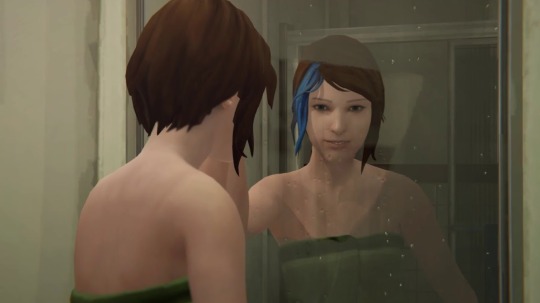
Effectively chronicles the evolution of Chloe. Before the Storm (BTS) takes the player through key events of Chloe’s past, which made her into the familiar blue haired punk from the original Life is Strange (LIS 1). It explores flashbacks and dream sequences of her father’s death and Max’s departure, all while showcasing other significant moments of Chloe’s formation: David’s moving in, her expulsion from Blackwell, and, of course, the relationship with Rachel Amber, powerful enough to break her by its ending. Every step along the way of Chloe’s path seems appropriate and motivated, and it’s fascinating to witness the moments that make Chloe who she is when you meet her in LIS 1. It’s well done, and something I really enjoyed.
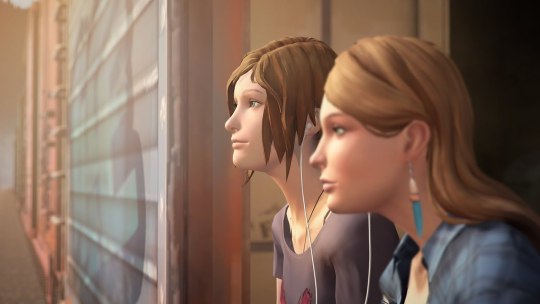
Equally satisfying paths of friendship and romance. Just like in the original game, BTS unapologetically allows the relationship between its strong female protagonists to take a romantic turn. However, in an even braver move, the game also allows the player to have them remain friends, sending the story down a path no less developed or fulfilling. In a world where saying "we're just friends" is a strategy for rejecting unwanted lovers and the friend zone is something to be dreaded (speaking from personal experience are we?), this series continues to advocate for emotional intimacy in friendships, inspiring us to go deeper, love better and in a more supportive way, reminding us how life-giving (and often under appreciated) our friendships can be. This was a thematic thread I was hoping to see expanded upon from the LIS I, and once again, Deck Nine didn't disappoint.
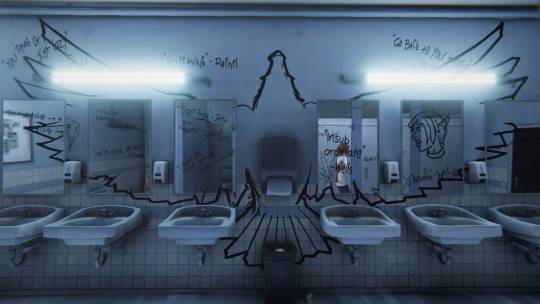
Beautifully interwoven symbols & motifs. Pay close attention to anything related to ravens, fire, eyes, or lying. These all start small, but build powerfully and are visited throughout, tying the story together. The game also revisits images from LIS 1: the doe, storm, totem pole, squirrels, etc. drawing parallels between the games through these symbols (Chloe’s raven to Max’s doe - the storm to the wildfire). And while Max left her mark on the world through her photography, Chloe prefers a more literal approach. Her graffiti pen tags (along with her outfit selections) allow the player to further interact with these symbols, in addition to making fun collectibles to hunt down. It was really neat to notice these little details which the writers and designers crafted with care, and it definitely added to the impact of the story.
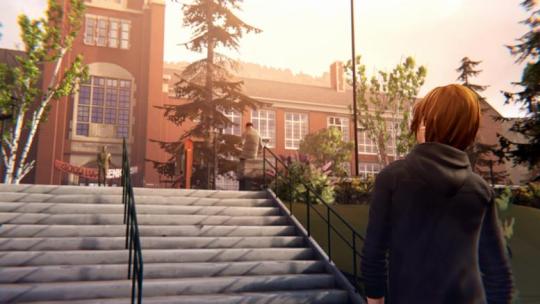
A nostalgic return to Arcadia Bay. The contrast of new adventures unfolding in familiar locations was a really neat element of the prequel series. The game provides the player with plenty of moments to simply take in their surroundings alongside a killer soundtrack (more on that later), and I definitely took advantage of it, especially in Chloe’s room, Frank’s RV, the junkyard, and all over Blackwell. It was so evocative just to see these places again, and interesting to get Chloe’s reflections on them. Like Chloe, these places also evolve as her backstory plays out (e.g. junkyard hangout room, Chloe’s truck) providing the player with a deeper understanding of the LIS 1 world’s origins.
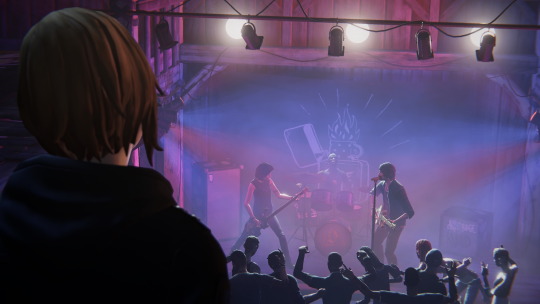
The soundtrack. Deck Nine placed their game’s music in different hands than Dontnod, but ones no less apt. Daughter did an amazing job creating haunting, emotional, nostalgic, atmospheric songs to accompany Chloe’s journey, both diegetic (like Skip’s song) and not. The game also features other singles like Speedy Ortiz’s “No Below,” which perfectly capture what Chloe’s going through at this point in her life. It’s a soundtrack I simply had to purchase after playing through the game, and when I’m out and about and the songs come up on shuffle, I’m immediately taken back. I almost start expecting to see objects highlighted in white as I look at them.
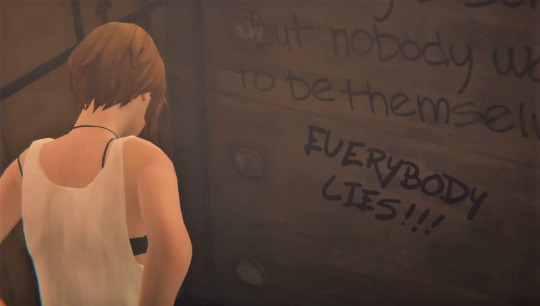
Morally and philosophically thought provoking themes. Of course, like LIS 1, the game explores friendship, love, care, and trust, but overall, the central question the game asks is: Is it better to protect someone you love with a lie, or honor them with the truth? Whether or not lying, or concealing the truth, is always wrong is a very interesting question, and it’s one I’ve thought a lot about (I’m actually working on a theology essay about it - but that’s another blog). And, while it’s a question other games have explored (I’m looking at you, The Last of Us) the game provides a unique take on the question by having the player answer it with his/her final choice, ending the game with a more philosophical but significantly less dramatic choice than LIS 1, but nonetheless thought provoking in its own right.
What Got in the Way:
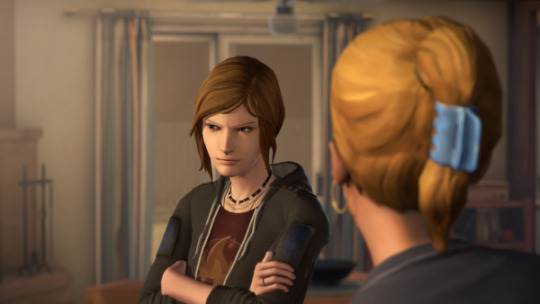
Chloe resists player shaping too much, much more than Max. With Max, I felt like her power of time control was in my hands. I could wield it for mischief, exact my justice as judge, jury, and executioner, or show mercy and love. Also, this power combined with the game’s mechanic of allowing you to restart from any point in the story made it easier to play Max right, ensuring that her story played out the way you wanted it to. Naturally, without Max’s time powers, Chloe’s decisions weigh more and are harder to undo. While this choice was intentional on behalf of the studio, rather than teaching me something about Chloe or life, I just wound up Googling the results of the choices more often or regretting not doing so as I’m smashing buttons, desperately trying to skip cut-scenes after loading a previous save. Basically, reversing your choices is way too tedious. Before you make a choice, get ready to live with it.
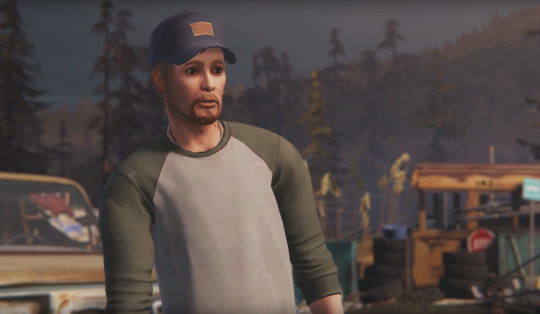
Too many unconnected dots between BTS and the original game. While BTS uncovers much of LIS 1’s backstory, it still leaves many questions unanswered. For example, what kind of relationship did Rachel have with Frank? Or, how did Rachel first become involved with Nathan’s photography experiment gone-wrong? These were things I was expecting to understand before the game’s end, and I was surprised to see the credits roll first. If it were up to me, I would have gone through all of that and ended the game just after the start of LIS 1, when Chloe reunites with Max.

Humanizes the villains until there’s no one left to hate. Almost. At one point or another in the game, Chloe comes up against Drew, David, Principal Wells, Nathan, Mr. Prescott, Mr. Amber, Sheldon, and Damon as adversaries. With the exception of Damon, who is this game’s Mr. Jefferson (the creepy bad guy who’s evil to be evil) the game attempts to generate sympathy for nearly every antagonist. For example, Drew’s only a mean drug dealer because he’s trying to financially support his little brother and dad. David really cares about Chloe and Joyce, but he lost his best friend in the army. Wells is just trying to protect the school, Nathan was bullied into his perversions, Mr. Prescott loves Rachel too much and is trying to protect her, etc. Sheldon’s genuinely a creep but if you give him what he deserves and tell Damon he’s a snitch, you have to read his desperate texts begging for Mercy.
I actually think the game did a great job humanizing certain characters (David, Drew, Mr. Amber), but I think it was confusing to try to arouse sympathy in the player for Nathan, for example, before his commits his terrible crime. What really put me over the edge was finding a letter in the hospital from Nathan’s dad where he offers to anonymously cover Mikey’s hospital costs. We see him bullying his son, he’s supposed to be the reason Nathan turns to his evil ways, and yet we’re supposed to believe deep down he’s really a good guy?
I get the point. Real people aren’t black and white, good and evil, it’s always more complicated than that. Still, I would draw a distinction between understanding why someone is evil and actually feeling bad for them, and instead of cheapening his power as a threat, I would have left Mr. Prescott among the Darth Sidiouses of Before the Storm.
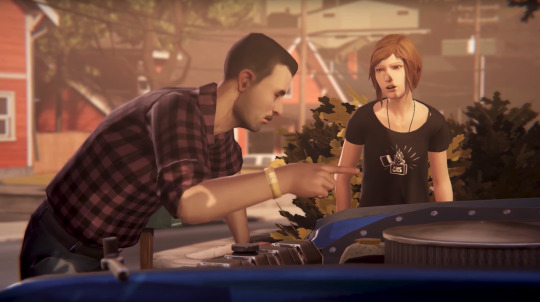
Initially jarring change of voice actors. It just so happens that I began playing Guerrilla Games’ Horizon: Zero Dawn as I started BTS, so I felt like Chloe pulled a Scooby-Doo: The Movie and transported her soul into Aloy’s body, (Ashly Burch voices Chloe in the original game and the protagonist of Horizon: Zero Dawn - quite excellently, in fact) but the change in voice actors shook me up at first. Though it seems like Deck Nine made an effort to get most of the original voice actors, you’ll notice the new voices for David and Chloe. This seems to be the result of a SAG-AFTRA strike, so it wasn’t really under anyone’s control, but still, it would have been nice to have the same actor for the game’s main character. Took me about an episode to get over it and used to it.
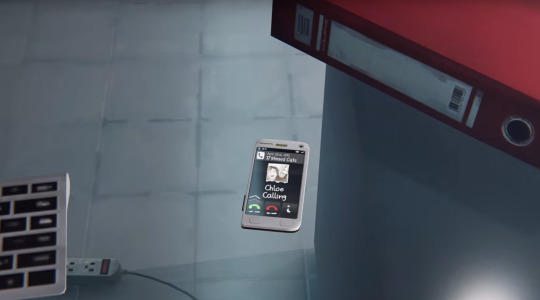
Ends on a sour note. Chloe’s relationship with Rachel made Before the Storm one of the most beautiful stories I’d experienced, and it almost ends on a nostalgic note, panning through photographs that capture their memories together. Instead, the game ends in that infamous dark room where Rachel is drugged and photographed before her murder, with Chloe’s missed calls blowing up her phone. This immediately ripped me from the warm, reflective feeling I experienced over Chloe and Rachel and instead brought back the rage and disgust I had for Nathan and Mr. Jefferson. Whether by ending the game when Chloe meets Max (as I’ve suggested earlier), or ending it on Chloe’s last moments with Rachel, maybe even allowing them to exchange some touching (final - as the player knows it) words, I would’ve ended the game in the mood it so effectively created where I felt both sad to let Rachel go, and grateful for the mark she made on Chloe. Ending it on that final scene seemed like a missed opportunity.
Final Thoughts: (Rating: 7.5/10)

For players who’ve never experienced Life is Strange before, I’d recommend starting with the original series. For those who enjoyed the game, Before the Storm is a definite should-play. It’s worth it for the return to Arcadia Bay’s landscapes and characters alone, but you’ll also discover what Blackwell looked like before Max, who the mysterious Rachel Amber really was, why nearly everyone adored her, and what transformed Chloe from Max’s pirate-obsessed childhood best friend into the blue-haired girl waving a gun around in the girl’s bathroom. However, if you’re expecting it to be too much like the first game, you may be disappointed. To get the most out of it, I’d recommend trying to step into Chloe’s shoes and playing the character as true to herself as possible, rather than trying to shape her choices according to your own preferences. Allow yourself to act impulsively, make mistakes, and brace for the consequences. Undoing Chloe’s actions proves a lot more tedious than those of the time-traveling Max, so try to do it right the first time. Oh, and don’t expect too many answers. You’ll get plenty of great ones, but just like the native spirits of the raven and doe, they have to leave some mysteries unsolved. In the words of Rachel Amber, “life needs a little mystery,” and after all, it’s mystery that makes life strange.
#Game Review#Life is Strange#Before the Storm#life is strange: before the storm#LIS#BTS#max and chloe#rachel and chloe#chloe and max#chloe and rachel#Game#video games#Deck Nine#Square Enix#Dontnod#Unity#Game Writing#Writing#Review#Narrative#Narrative Design#Nostalgic#Telltale#narrative game#lis bts#lis before the storm#Game Writers#gameblr#gamer#gaming
9 notes
·
View notes
Text
...my sins laid out on a dead man’s scales. Redactions for effect.
\\\\\\\\\\\\\\\was driving on Monday morning when his phone rang. He could not pick up, but when he saw who had called – someone who was friends with him and \\\\\\\\\\\– he guessed what was coming. He called back and learned that \\\\\\\\\, just \\\\\years old, had been picked up from his home by an ambulance on Sunday night. On the way to hospital he went into cardiac arrest. He died shortly afterwards. It transpired that he was also suffering from cirrhosis of the liver.
\\\\\\\\\\\\\ a comedian who had been mentored by \\\\\\\\\\ over the past decade and become very close to him, had been worried about his friend for months. “In this last year, I’d been telling him he needed to sort his life out. It came to a head in Edinburgh this summer. He showed up and – there’s no easy way to say it – he looked like a dead man walking. I went to see his first performance, and he shouldn’t have been on stage. After the first week, I told him he needed to cancel the run and go home and see a doctor. It was like he was waiting for someone to give him permission. I called him three days later, but he still hadn’t gone to the doctor.” Even so, as \\\\\\\\\\\\ notes, “to a lot of people who hadn’t seen him for a while, his death came as a shock”.
It needs to be remembered that ///////// was not the man one saw on TV. The persona that made him famous in the early 1990s on /////////– the melancholic, wry, puppyish indie boy – was part of who he was, but only part. He was also arrogant, selfish, demanding and sometimes cruel. I know this because for several years during the 2000s, I was close friends with him. Then, a decade or so ago, he stopped speaking to me, because he felt I had not responded to his needs with sufficient vigour. In the past few years, we began speaking again – I went to see his shows, we texted, we saw each other a couple of times – but my being cut off was nothing unusual. “There was a long period where we were the closest people in the world,” says one comedian who knew him in his first flush of fame. “We’d go out five times a week, call each other three times a day. But everyone fell out with Sean because he always wanted them to be there for his purposes.”
It’s also worth noting that it is hard to get people to talk publicly about Hughes, precisely because so many people had bad experiences with him, especially women. Those who knew him talk of how he seemed to be looking for reasons to cut off people he loved: Donnelly recalls Hughes falling out with one of his oldest friends a few years back, and how he told Hughes that the other person had done nothing wrong, but this made no impression. It was as if he was afraid of intimacy, and this meant women would experience the absolute worst of him. No one I speak to will go into specifics – it seems not to be something people want to revisit – but dark mutterings among women who had relationships with him floated around like an ugly cloud, becoming visible again after his death.
When I got to know Hughes, at the start of the last decade, he was at the peak of his fame. For 11 series, from 1996 to 2002, he was a team captain on Never Mind the Buzzcocks, the TV comedy pop quiz. He had gone from NME famous, known to a constituency of indie guys and teenage girls, to BBC famous, known to everyone. Famous enough that when he went to a pub in which he wasn’t a regular, he would insist on sitting at a corner table with his back to the room, because if he was recognised he would be pestered.
He was torn between desiring fame and wealth, and contempt for the way he had achieved it. He lived for the last 15 or so years in a huge and beautiful house in Crouch End in north London, paid for with the Buzzcocks money, but the thing that caught your eye as you walked in was a large print of Jane Bown’s portrait of Samuel Beckett: money and art, together. “Sean once said to me: ‘What I do is above comedy,’” says someone who worked with him on Never Mind the Buzzcocks. “I tried to explain that there’s nothing above comedy. He fell for this dark, lyrical poet stuff. All my friends are comics, and so many of them have been ruined by quiz shows.”
We were honest with each other and listened to one another’s insecurities continually. He was very open with me
At times on Buzzcocks, you could see his disdain for what he was doing, even if it also made you laugh. Other, more telling incidents didn’t make it to screen: the time he was punched in the face before a show by Jah Wobble, who had been furious about the way Hughes had conducted an interview with him on London’s BBC local radio station GLR. Or him demanding to be set up to deliver a gag, then refusing to tell it. “I’m not going to do it,” he said, gesturing to his teammates – musicians rather than professional comedians – “because these fucking useless wankers aren’t joining in.” He wasn’t joking.
“Never Mind the Buzzcocks may have been the end for him. It was a great thing to do, but it wasn’t a great thing for him to do,” says one comedian friend. “It was the biggest thing he ever did, and Sean was unhappy about that.”
“I think he wanted to be an artist,” says his friend Stephen Jones, who records as Babybird (who also had the experience of being dropped by Hughes, and then reconciled). “Buzzcocks was just a paid job, but the seriousness was there in his books.” There had been a couple of collections of poetry and comic prose in the early 90s, and Hughes then tried his hand at being a novelist with The Detainees (1998) and It’s What He Would Have Wanted (2000). Both the acclaim and sales of his literary heroes eluded him, however.
He did the show, I think, because he loved music, even if it ended up disappointing him. But if Buzzcocks was the pay cheque, the radio show was where he indulged his delight in music and musicians. He was a loyal supporter of his favourite bands – Yo La Tengo, American Music Club, the Wedding Presentamong them – and a girlfriend of his once told me that musicians always saw the best side of him. Perhaps it was because it was one thing he was sure he wasn’t better at than them.
“Sometimes I had to steer him away from talking so much about the band, because it was a bit like doing an interview, such was his fascination with it,” says David Gedge of the Wedding Present. “We would bare our souls to each other all the time. That was the nature of our relationship and I will sincerely miss that. We were honest with each other and listened to one another’s insecurities continually. He was very open with me; he’d quite often arrive at wherever we were meeting and launch into something incredibly personal. I once asked him how he was, and he said: ‘Well, my dad just died.’”
Hughes left Buzzcocks in 2002, and retreated from comedy, but he still pursued fame and wealth, albeit with less success. As well as the novels, he appeared as Peter Davison’s sidekick in four series of the gentle crime show The Last Detective, starred in the long-running West End play Art, and voiced the character of Finbar the Shark in the infants’ TV animation Rubbadubbers. I asked him why he took that role, given his desire to be treated seriously and his seeming lack of interest in kids. “Do you know how much money Neil Morrissey made out of Bob the Builder?” he replied.
“More than most, he was obsessed with money,” remembers one old friend. “I can barely remember him buying a drink. And that was when I was his best friend, and he had his own TV show. That’s the paradox: a man who was so jealous about money and also wanted to be an artist.”
Perhaps he realised that being a comedian was what he was best at. He returned to standup in 2006, building up to the show about the death of his father – Life Becomes Noises – that seemed to mark a decisive return as a solo stage performer.
“Maybe he got back to doing it on his own terms,” says the comedian Adam Hills, who became close to him in recent years. Hills mentions a remark Steve Martin once made about being a superstar comedian, that if you do new material the audience don’t laugh because they want to hear the old stuff, but if you do the old stuff the audience don’t laugh because they already know it. Coming back, no longer a superstar, meant that Hughes could perform the comedy he wanted. “It felt to me in his last few years that he was doing it because he liked it.”
It seems he changed as a person, too. There is a stark divide between the memories of those who were friends with him at the peak of his fame and those who came to know him in recent years. They sound as if they are describing different people. Hannah Morris, an Australian actor who appeared with Hughes in his improv panel stageshow Blank Book says: “I knew of his reputation, but I never saw that man at all. He was very kind and very generous – and very gentle, actually. Maybe that was something that had changed.”
And how was his attitude to Morris, not as an actor but a woman? “I hung on to the idea of having a woman’s voice in Blank Book. Being on stage with three men, I tried to include a woman’s voice, and he valued that. He said that to me. He said he liked hearing that.” Donnelly agrees that his attitude towards women changed, that his anger and cruelty had dissipated, perhaps because “in the last five years I would say he had no interest in sex any more”.
Hills first met Hughes 20 years ago, as his support on an Australian tour, but their friendship developed in recent times. Like Morris, he never experienced the man who could be so vindictive. “What I felt in the last couple of years was how genuinely concerned he was about how I was doing and how much he cared.”
Donnelly, too, was helped and nurtured by Sean: they became friends when he was asked to support him on a tour of Switzerland, which he remembers as being “like a holiday”. He would see flashes of the old Sean, “but I’d always try to be the voice of reason. We bonded over lots of stuff; we’d go and mooch around Tate Modern. He taught me more about art than anyone I’ve ever known. He’d talk about art like he talked about about football.”
The last time I saw Sean, he was not drinking. It was peculiar, spending an evening alone in a pub with him, just a mineral water in front of him. My main memories are of large groups of people and large amounts of alcohol: one peculiar night getting very drunk with “some friends” who turned out to be most of the cast of EastEnders; the night a group of us were doing a pub quiz and Gem Archer, newly installed in Oasis, walked in – everyone turned around to stare, and Hughes observed, loudly: “He’s in here all the fucking time but until now he’s just been that cunt from Heavy Stereo.” As was often the way with Sean, it was a joke, but it felt as though it was delivered with teeth.
In the last year, since his mum died, the drinking spiralled. It was horrible. We'd speak at 10am and he’d be pissed
But then he returned to drinking, telling the Irish Times: “Apparently I’m tedious when sober. People were uncomfortable when I wasn’t drinking. It made them question their own habits.”
“That was bollocks,” Donnelly says. “When he wasn’t drinking he was the most stable I ever saw him, but he flat-out told me he was bored. He didn’t have much in the diary – he only did short tours – and he just told me he was bored. So first he started smoking again, absolutely chaining it. And then the drinking started again … When he first gave up, he just stopped overnight. So I always thought it wasn’t an addiction in that full-on sense. But in the last year, since his mum died, it spiralled. It was horrible. I’d speak to him at 10am and he’d be pissed.”
Yet Hughes was able to compartmentalise his life so thoroughly that other friends had no idea what was happening. “It didn’t seem to me that he was drinking a lot,” Hills says. “It’s been very disconcerting the last couple of days, because the Sean I knew had been in good health and good spirits.”
I always wondered if he had been lonely. “I think he was a lonely person,” Donnelly says. “And he found it hard to hold down relationships. He would call friends claiming he needed to check something, but really he wanted someone to talk to.”
Mark Lamarr is the comedian with whom Sean’s name is perhaps most closely associated, thanks to his hosting of Never Mind the Buzzcocks. “I guess you could have called us both womanisers,” he says. “We were both young, rich and famous. We both had lots of girlfriends. One day he rang me, and it was the only time I remember him reaching out with sadness. He said: ‘I really worry you and I are going to end up being lonely old men. I said: ‘I’m not worried, because I like being alone.’ The big sadness is that he didn’t even get to be old. He just got to be lonely.”
It’s hard to write about Hughes, not just because he had been my friend, but also because my memories – like many other people’s – are not all positive. I can laugh about the time at a Cure aftershow party when he tried to convince people he was the estranged nephew of far-right Austrian politician Jörg Haider, but I can also recall his unerring eye for other people’s weakness and insecurity, and his willingness to deploy it. I can smile at the memory of going with him to watch Crystal Palace, and him shouting at the Charlton player Luke Young, in his best Obi-Wan Kenobi voice, “Run, Luke, run!” every time Young was in earshot, but then I think of women I know who had encounters with him and how horrified they were by his behaviour.
I shall go to his funeral on Monday, and I will still be asking myself: who was my old friend? And why did his life turn out this way?
• This article was amended on 19 October. An earlier version said Luke Young was a Crystal Palace player. This has been corrected to say he played for Charlton.
0 notes